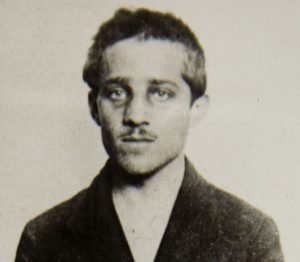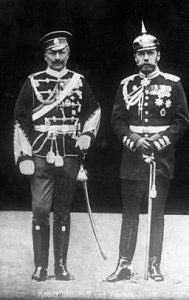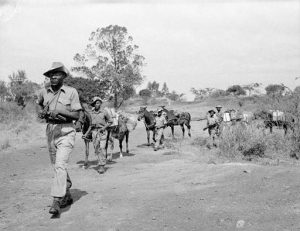Gavrilo Princip

- What does he reveal about the causes of WW1?
Gavrilo Princip, the murderer of Archduke Franz Ferdinand, was just the representative figure of young Serbian influenced population in Bosnia. Therefore, he was not directly responsible for the commencement of the First World War. One of the primary sources written by his comrade, Borijove Jevtic, reveals that their direct goal was to terminate the next ruler of Austria-Hungary, but to stir up a war involving majority of the European nations was not included in their first aims (“The Assassination of Archduke Franz Ferdinand”). According to the Constitution of the Black Hand, it is clearly stated that their focuses are on “national liberation and unification” (“Constitution of the Black Hand”). In this article, it is implicitly demonstrating its central theme; “unification” of the Balkans under the domination of Serbia. “Independence” is only encouraged against their mutual enemy, Austria-Hungary.
The responses of local media of neighboring countries such as Netherlands, France, Poland and Turkey, right after the incident, indicate about the lack of predictions regarding the beginning of the World War 1 (eurnews). At the time the incident had happened, majority of the media did not directly connect this assassination to the gradual upheaval impacting Europe on a global scale. Princip, in terms of his role played in this act, was a puppet. He was even directed by the member of the Black Hand, who were serving for the Serbian government, to kill himself due to his fear of investigators tracing their relationship between the Serbian government and the assassination (Duffy, “Who’s Who – Gavrilo Princip”).
Works Cited in URL links
“The Assassination of Archduke Franz Ferdinand”:
https://wwi.lib.byu.edu/index.php/The_Assassination_of_Archduke_Franz_Ferdinand
“Constitution of the Black Hand”:
https://wwi.lib.byu.edu/index.php/Constitution_of_the_Black_Hand
eurnews. “WWI in historic newspapers: The assassination of Franz Ferdinand”:
http://www.europeana-newspapers.eu/wwi-in-historic-newspapers-the-assassination-of-franz-ferdinand/
Duffy, Michael. “Who’s Who – Gavrilo Princip”:
http://www.firstworldwar.com/bio/princip.htm
Willy and Nicky – Best Friends…at least for Willy
- Why should we bother to learn about the relationship between Willy and Nicky in order to gain further significance regarding the cause of WW1?
Analyzing the relationship between Kaiser and Tsar provides us new insights regarding the process that led up to the German declaration of war against Russia. They were, in fact, cousins. Their relationship depicted in the Willy-Nicky Telegrams gives an impression to the audience that they were cordial to each other, benevolent for an assistance, at least for the beginning (“Willy-Nicky Telegrams”). It seems that they show consistent affection and admiration to each other, often referring to childhood events and shared memories between two of them (“Willy-Nicky Telegrams”). However, by comparing different sources, it is indicated that their relationship was not as simple as it was portrayed in the Willy Nicky Telegrams.
According to the article “The last emperors,” shows their relationship distantly. It is mentioned that: “When he [Nicholas] failed to respond positively, Wilhelm would get angry and encourage anti-Russian elements in his government” (Carter). This implies the personal qualities of Kaiser and Tsar, in which Kaiser often getting jealousy towards his cousin, portraying Kaiser’s immaturity in contrast to Nicholas. Further more, when both of them met in 1913, “George and Nicholas tried to grab private moments to talk, while Wilhelm did his best to stop them, convinced that they were politicking” (Carter). These quotes show Kaiser’s belligerent characteristics in regards with Nicholas. It is clear that both of them did not go along well in terms of friend-like relationships. This complex relationships from their childhood did leave impacts on their diplomatic relationships. This is one of the excerpt from Kaiser’s account in July 1914:
“This shows plainly how little we had expected – much less prepared for – war in July, 1914. When, in the spring of 1914, Czar Nicholas II was questioned by his Court Marshal as to his spring and summer plans, he replied: ‘He resterai chez moi cette année parce que nous aurons la guerre’ (‘I shall stay at home this year because we shall have war’). (This fact, it is said, was reported to Imperial Chancellor von Bethmann; I heard nothing about it then and learned about it for the first time in November, 1918)” (Duffy, “Primary Documents – Kaiser Wilhelm’s Account of the Events of July 1914”).
What is significant about this is that this excerpt reveals that Russia was expecting the coming of the war while Kaiser did not (Duffy, “Primary Documents – Kaiser Wilhelm’s Account of the Events of July 1914”). This means that Russia had more advantages in preparing for war since Tsar had been aware of the tensions between European countries. However, this quote also suggests that German chancellor, Bethmann, failed to report important information to Kaiser (Duffy, “Primary Documents – Kaiser Wilhelm’s Account of the Events of July 1914”). All of these aspects reveal how Kaiser was isolated from both inside and outside, with his cousin gaining more advantages than him, as well as his German chancellor choosing not to share one of the most important information concerning German diplomacy.

Works Cited in URL links:
Carter, Miranda. “The last emperors”:
https://www.theguardian.com/lifeandstyle/2009/sep/12/queen-victoria-royal-family-europe
Duffy, Michael. “Primary Documents – Kaiser Wilhelm’s Account of the Events of July 1914”:
http://www.firstworldwar.com/source/julycrisis.htm
“Willy-Nicky Telegrams”:
https://wwi.lib.byu.edu/index.php/The_Willy-Nicky_Telegrams





